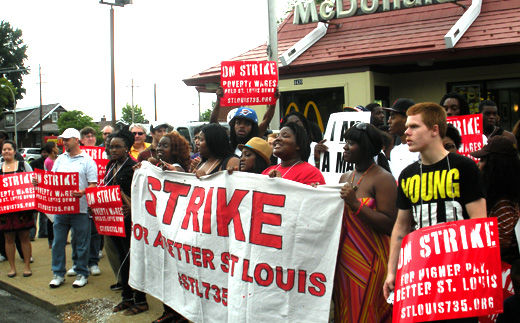
Two years ago they said it would never happen. The fast food industry has claimed for years that their workforce is mostly high school and college age students looking for part-time work and a little extra cash – not hard working people trying to provide for their families.
It all started on November 29, 2012, when New York City’s fast food workers went out on strike. They demanded a living wage and union recognition. Hundreds of worker from countless stores achieved a groundbreaking victory and laid the collective foundation for a fast food workers movement.
Just a few months later, Boston and Chicago fast food workers went out on strike, followed quickly by St. Louis, Detroit and Kansas City. In less than a year fast food workers from over 100 cities had changed the national narrative to focus on income inequality.
Shortly after a successful fast food workers’ organizing convention and a wave of national strikes on December 5, 2013, fast food workers entered 2014 ready and focused.
Across the pond, international unions began paying attention, too. For example, the International Union of Food, Agriculture, Hotel, Restaurant, Catering, Tobacco and Allied Workers’ Association (IUF), representing trade unions in over 126 countries, took a bold step by reaching out and beginning a dialogue with Fast Food Organizing Committees and the Service Employees International Union. Those discussions led to the emergence of a global fast food strike, held on May 15th.
Here in St. Louis, Missouri, fast food workers joined 150 sister cities and 33 countries in the largest strike of fast food workers to date.
Workers went out on strike starting at 6 am and took over stores throughout the city and county, stopping daily operations and taking a militant stand against poverty wages and injustice on the job. At noon, four Wendy’s grill employees walked off the job in front of management to join the strike line.
The global strike was a huge success for low-wage workers around the world and led to the massive 15,000 strong takeover of McDonald’s corporate headquarters in Oakbrook, Illinois. While shareholders, upper level management and the CEO met to discuss the company’s’ annual profits, 101 fast food workers were arrested for participating in nonviolent, civil disobedience at McDonald’s doorstep.
The fast food industry continues to get hit hard by waves of strikes and workers continue to escalate their tactics, but the question remains: What more can be done?
In order to create organizational sustainability fast food workers must build a structured organization, a member-led democratic organization focused on the needs of its membership and the broader progressive movement.
In St. Louis, weeks before the global strike, a shutdown committee was created and tasked with organizing deeper into workers’ stores. We wanted to show the boss our real, collective power, while continuing to develop leaders from the fast food base.
As we continue to build our movement by organizing new workers and developing new leaders we should emphasize a key aspect of this campaign: We are not selling a product. We are empowering workers. We are promoting organic ownership of this campaign. We are developing local fast food leaders.
There are millions of fast food workers nationwide ready to organize, fight for $15 and form a union. However, there are only a handful of full-time organizers. Obviously, we have to train member-leaders, fast food workers capable of running their own shop organizations, able to recruit new members and reach out to the broader community for support.
St. Louis, along with other fast food organizing committees, is forming fast food shop steward councils. Our goal is to bring traditional organizational structure to a non-traditional union setting. Those councils also create an opportunity for local organizing committees to focus on and develop worker education that goes beyond immediate demands.
Additionally, just as the global fast food workers’ strike added power to our local campaign, our support of unions like SEIU, CWA, AFGE, the Laborers’, and the AFL-CIO, among others, have added power to their campaigns.
By working together we will be in a stronger position to see victories that benefit all workers.
Recently, St. Louis fast food workers joined SEIU Healthcare members on the picket line as they fought Christian Care Nursing Home for a fair contract and a living wage. At that moment, low-wage workers in two completely different industries, healthcare and fast food, came together to fight back against injustice, while promoting union solidarity. This is where we see real worker power unfold – power that builds the kind of solidarity that we need to grow.
Fast food workers are being taught how to negotiate with management, deal with problems and use direct action when needed. There are no contracts. No official union has been recognized, but that does not stop them from talking like a union and, more importantly, acting like one.
H.A. Barrows is the pen name of a fast food organizer.
Photo: St. Louis fast food rally in July 2013. Peoplesworld.org

MOST POPULAR TODAY

High Court essentially bans demonstrations, freedom of assembly in Deep South

Zionist organizations leading campaign to stop ceasefire resolutions in D.C. area

U.S. imperialism’s ‘ironclad’ support for Israel increases fascist danger at home


UN warns that Israel is still blocking humanitarian aid to Gaza






Comments